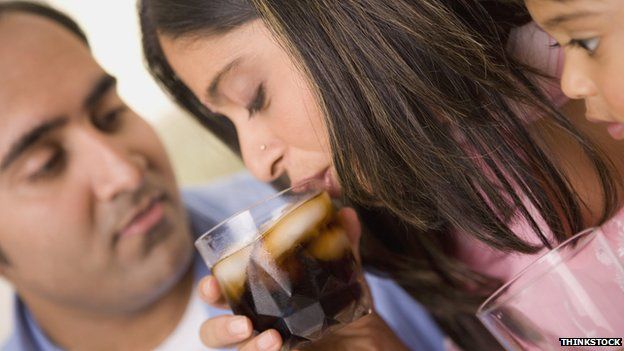-
13 July 2015
- From the section Health

An extra 20% tax on sugary drinks should be introduced to tackle the obesity crisis, the British Medical Association says.
It estimates poor diets are causing around 70,000 premature deaths each year.
In a major report on unhealthy diets, the body called for the extra money raised to be used to subsidise fresh fruit and vegetables.
The Food and Drink Federation said the measure would not change diets.
There has been growing concern about the damaging impact of sugar on health – from the state of people’s teeth to type 2 diabetes and obesity.
In its Food for Thought report, the BMA warns that a 330ml can of pop is likely to contain up to nine teaspoons of sugar that are simply “empty calories”.
The report said taxing specific food groups – such as the sugar drinks tax introduced in Mexico – were shown to cut consumption.
Doctors said a tax of at least 20% would be needed to deter customers. It would mean a 65p can of fizzy drink would cost at least 78p and a two-litre bottle would shoot up from £1.85 to £2.22.
The report says the extra revenue should be used to make fruit and vegetables cheaper so that we “create an environment where dietary choices default to healthy options”.
‘Massive problem’
Dr Shree Datta, from the British Medical Association, told the BBC: “I think it is a massive problem illustrated by the fact obesity is creeping up.
“We’re looking at 30% of the UK population being obese by the year 2030, a large extent of that is due to the amount of sugar we’re actually consuming without realising.
“The biggest problem is a lot of us are unaware of the amount of sugar we are consuming on a day-to-day basis.”
The government’s main approach to obesity has to been to work with the food industry to get it to voluntarily reduce calorie content.
A spokeswoman said obesity was of “great concern to this government”.
She added: “There is no silver bullet but we do want to see industry go further to cut the amount of sugar in food and drinks so that people can make healthier choices.”
The BMA’s report is timely. Later this week, the UK’s official Scientific Advisory Committee on Nutrition will publish its final advice on the amount of sugar we should be eating.
Its draft report said sugar added to food or naturally present in fruit juice and honey should account for 5% of energy intake.
The current recommended level is 10% and many people fail to meet that.
Ian Wright, director-general of the Food and Drink Federation, said: “We share the BMA’s concerns about the health of young people in the UK.”
However, it said many foods were already taxed at 20% through VAT such as soft drinks and confectionery.
He added: “Where additional taxes have been introduced they’ve not proven effective at driving long-term, lasting change to diets.
“In recent years, calories in household foods and drinks have been gradually lowered through recipe reformulations, including sugar reductions, and changes to portion sizes.”


